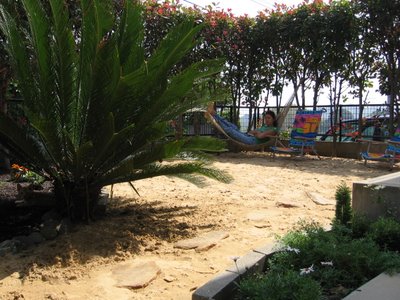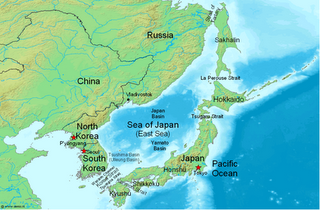
Humidity and mold are left as the rainy season begins to taper off. I can finally see the rays of light beaming in through the clouds as I sunbathe in the man-made (gino-made) beach in the front yard. It's nice to be home.
I travelled back from Korea Wednesday while North Korea was simultaneously firing missiles, unbeknownst to me. North Korea set off an international furor when it tested seven missiles, all of which landed into the Sea of Japan without causing any damage.
The Sea of Japan (日本海) is a marginal sea of the western Pacific Ocean. Like the Mediterranean Sea it has almost no tides owing to its nearly complete enclosure from the Pacific.

There is a controversy between Japan and Korea over what the international name for this sea should be. Over the centuries, this sea has been called by various names. Japan insists that it be called Sea of Japan (Nihonkai). South Korea insists on East Sea.
The sea is bound by the Japanese islands of Hokkaido, Honshu, and Kyushu and the Russian island of Sakhalin to the east, and the Korean peninsula and mainland Russia to the west.
Korea thinks that the name was unfairly standardized during Japanese rule of Korea, and thus remains a symbol of Japan's imperialistic past. South Korea insists on the name "East Sea", claiming that the sea was known as "Sea of Korea" or "East/Oriental Sea" until Japan's militant expansionism. South Korea proposes "East Sea" because it is one of the various English names found in historical European maps. Korea's position is that while "Sea of Korea" is actually a more common historical European name than "East Sea," East Sea, in reference to the Asian continent, rather than a specific country, is a more neutral name. Korea argues that during the critical period for asserting the name East Sea in the international arena, Korea was deprived of its sovereignty, and had no diplomatic representation on the global stage.
How about Japan's take? The Japanese government insists that the name "Sea of Japan" had internationally established itself as a single name by the early 19th century when Japan was under the isolation policy, Sakoku. Sakoku (鎖国) literally means "country in chains" or "lock up of country." Whereby nobody, whether foreign or Japanese, could enter or leave Japan on penalty of death. This lasted from 1641 to 1853, though the term was not coined until the 19th century. Japan therefore claims that at that time they could have had no influence on the international community in regards to the naming of the sea. Therefore, the claim by the Koreas that the name is a "remnant of colonialism" in the early 20th century is completely groundless and changing it based on incorrect recognition cannot be accepted.
The United Nations Conference on the Standardization of Geographical Names (UNCSGN) and the International Hydrographic Organization (IHO) have so far neither accepted nor denied Korea's claims, but left the issue open to discussion while continuing to use "Sea of Japan". The United Nations confirmed its adoption of "Sea of Japan" in its official documents in March 2004.
Currently, however, as North Korea is teasing the international front with missile testing, I guess we'll just have to put the name game on the back burner.









3 comments:
I know a place (or two)in Fallston that would love a yard like that. I wonder who I can find to do that?
your timing is great when you go to the Philipines and Korea. The Multitude is alway on duty (:)
My mom would always say "Rain makes you pretty." No wonder you're beautiful!
mom - you're such a cute commenter. You can't afford my yard man. ;)
Post a Comment